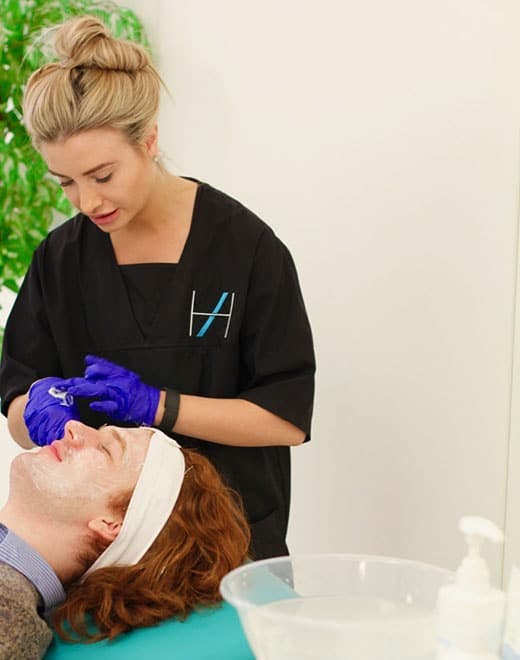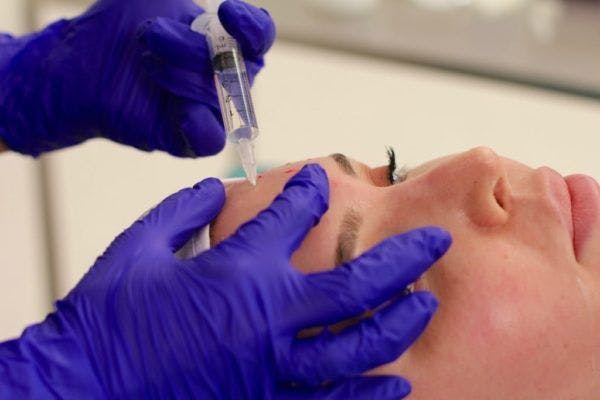Level 7 Injectables Vs. Cosmetic Dermatology, Which Course Is For You?

For most healthcare professionals, we hear the word ‘aesthetics’ and our first thought is of injectables such as dermal fillers and botulinum toxins. However, skin treatments, which were once rough and imprecise, are increasingly powerful and targeted tools. As the cosmetic results of new skin techniques emerge, treatments like chemical peels, microneedling, and mesotherapy are becoming highly popular for both patients and practitioners. In some regions, skin treatments are more popular than injectables. So, if you’re considering training in aesthetics, which course is for you?
Do No Harm
Aesthetic medicine should be treated in many ways just like conventional medicine. Cosmetic treatments should always start with interventions that have the fewest possible side effects and lowest complication profile, then move up towards more invasive, impactful treatments if these treatments do not resolve the patient concerns.
A major focus in aesthetics right now is dermal filler treatment – which in isolation, often do not abide by the principle ‘first, do no harm.’ For example, a patient with photo-damaged skin on the upper lip would be most appropriately managed with good lifestyle and skincare advice followed by skin treatments such as chemical peels or laser resurfacing; prior to augmenting the lip vermillion border or injecting directly into the lines with a soft tissue filler.
Frequency of treatment
Injectables are highly sought-after because of their immediate impressive results and have a high patient satisfaction. However, practising injectables exclusively also means you will only see each patient once every 4-6 months. When offering skin treatments your contact time is much higher as treatments take longer and patients will be back to see you more regularly. This gives you time to build rapport with your patient base and build lasting relationships whereby they trust you to carry out any treatments they may want in the future.
In the current competitive landscape of aesthetic practice it’s vital to build relationships with your patients and this is largely done by increasing contact time and educating them about the best ways to look after their skin. There’s little point treating Susan with Botox if she’s off on the sun-beds immediately afterwards. So few of our patients use UV protection that I almost never hear anything above ‘15’ when I ask about daily SPF. But being being the practitioner who can offer evidence-based skincare advice you can win trust, loyalty, and more regular patients.
Should you study skin before injectables?

If you’re already practising injectables, the Cosmetic Dermatology pathway offers the opportunity to become highly skilled in delivering a range skin treatments in your clinical practice. It offers a lot of theory on the principles of skin health, as well as three days of supervised masterclasses in a real clinical setting to perfect your technique, which far exceeds any brand-sponsored training options.
In an ideal world, you’d have a deep appreciation of skin science before penetrating the skin with needles. This would equip you to perform a treatment that does the least harm first, prior to resorting to risker, more invasive injectable procedures.
For non-prescribing practitioners, skin rejuvenation also offers a neat way to practice aesthetic medicine whilst pursuing a prescribing qualification – which would ultimately make the transition into providing injectables treatments easier.
Combining the two
More and more practitioners are delivering great results by using cosmetic skin treatments alongside injectables.
From a business point of view, skin treatments form a valuable part of a clinics revenue due to the way they can be incorporated into treatment packages. For example if a patient is concerned about fine lines and wrinkles around the eyes, micro-needling in combination with toxin injections could form the first part of the treatment, which can then be followed up with a series of chemical peels and mesotherapy treatments to work on targeting specific areas and issues with skin quality.

Mesotherapy is a popular treatment for targeting specific skin complaints
When a patient comes to see you it should be a journey, not a one-off treatment, and combining injectables with skin rejuvenation treatment programs allows for this. Ten years ago you could have had a business doing injectables alone, but the increasing demand for glowing perfect skin driven by social media makes skin based treatments often more popular.
Unsurprisingly, many new practitioners are opting to train in both skin techniques and injectables at the same time. That’s why we now offer complete Aesthetic Medicine Specialty Training. As the name suggests, Aesthetic Medicine Specialty Training offers mastery of both Injectables and Cosmetic Dermatology. The course includes the full Level 7 in Injectables (the new standard of training required by the JCCP to deliver toxins or fillers), a Foundation Day in Chemical Peels, Microneedling and Mesotherapy, two masterclasses in advanced skin peels and mesotherapy, and the host of online learning and support, with community benefits offered to all of our Level 7 students. We’re so confident in the calibre of Aesthetic Medicine graduates that we guarantee them an interview with an aesthetic clinic – or their money back.
So, if you’re considering training or investing in further training, don’t overlook the importance of cosmetic dermatology in learning to be outstanding.
About the Author
Dr Marcus Mehta is Medical Lead on our Skin Rejuvenation training courses. He is an aesthetics doctor with a postgraduate diploma in clinical dermatology. When not offering training or support to our community of postgraduate trainees, Marcus works with Dr Rita Rakus at her Clinic in Knightsbridge.
All information correct at the time of publication
Download our full prospectus
Browse all our injectables, dermal fillers and cosmetic dermatology courses in one document
By submitting this form, you agree to receive marketing about our products, events, promotions and exclusive content. Consent is not a condition of purchase, and no purchase is necessary. Message frequency varies. View our Privacy Policy and Terms & Conditions
Attend our FREE open evening
If you're not sure which course is right for you, let us help
Join us online or in-person at our free open evening to learn more
Our Partners














STAY INFORMED
Sign up to receive industry news, careers advice, special offers and information on Harley Academy courses and services

